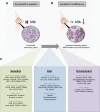Biological underpinnings of breastfeeding challenges: the role of genetics, diet, and environment on lactation physiology
- PMID: 27354238
- PMCID: PMC5005964
- DOI: 10.1152/ajpendo.00495.2015
Biological underpinnings of breastfeeding challenges: the role of genetics, diet, and environment on lactation physiology
Abstract
Lactation is a dynamic process that has evolved to produce a complex biological fluid that provides nutritive and nonnutritive factors to the nursing offspring. It has long been assumed that once lactation is successfully initiated, the primary factor regulating milk production is infant demand. Thus, most interventions have focused on improving breastfeeding education and early lactation support. However, in addition to infant demand, increasing evidence from studies conducted in experimental animal models, production animals, and breastfeeding women suggests that a diverse array of maternal factors may also affect milk production and composition. In this review, we provide an overview of our current understanding of the role of maternal genetics and modifiable factors, such as diet and environmental exposures, on reproductive endocrinology, lactation physiology, and the ability to successfully produce milk. To identify factors that may affect lactation in women, we highlight some information gleaned from studies in experimental animal models and production animals. Finally, we highlight the gaps in current knowledge and provide commentary on future research opportunities aimed at improving lactation outcomes in breastfeeding women to improve the health of mothers and their infants.
Keywords: diet; environment; genetics; lactation; mammary gland.
Copyright © 2016 the American Physiological Society.
Figures

References
-
- Ahluwalia IB, Morrow B, Hsia J. Why do women stop breastfeeding? Findings from the Pregnancy Risk Assessment and Monitoring System. Pediatrics 116: 1408–1412, 2005. - PubMed
-
- Akers RM. Lactation and the Mammary Gland. Hoboken, NJ: Wiley-Blackwell, 2002.
-
- Akinci A, Kanaka C, Eble A, Akar N, Vidinlisan S, Mullis PE. Isolated growth hormone (GH) deficiency type IA associated with a 45-kilobase gene deletion within the human GH gene cluster. J Clin Endocrinol Metab 75: 437–441, 1992. - PubMed
-
- Alam S, Hennigar SR, Gallagher C, Soybel DI, Kelleher SL. Exome Sequencing of SLC30A2 Identifies Novel Loss- and Gain-of-Function Variants Associated with Breast Cell Dysfunction. J Mammary Gland Biol Neoplasia 20: 159–172, 2015. - PubMed
Publication types
MeSH terms
Substances
LinkOut - more resources
Full Text Sources
Other Literature Sources
Medical
Molecular Biology Databases

